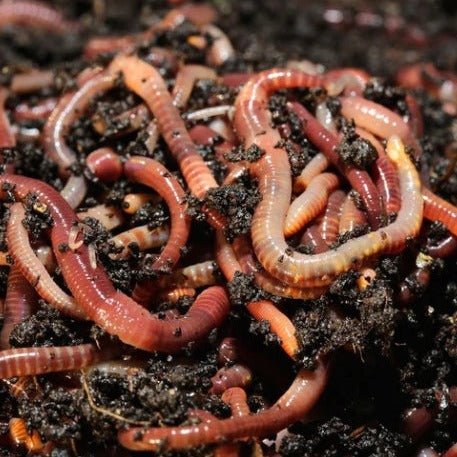Get Your Lawn in Top Shape with the Help of Lake Hickory Bait Lawn Care Solutions
Red Wigglers: The Unsung Heroes of Organic Waste Recycling
Red wigglers, or Eisenia fetida, offer as vital representatives in the organic waste recycling procedure, transforming thrown out products into valuable vermicompost. As the globe significantly looks for services to fight waste accumulation and boost agricultural productivity, recognizing the function of these worms becomes essential.
What Are Red Wigglers?
The remarkable resilience of red wigglers, medically understood as Eisenia fetida, emphasizes their vital duty in organic waste recycling. These small, reddish-brown earthworms are normally located in disintegrating organic issue, such as compost heap and manure heaps. Lake Hickory Bait. Unlike various other earthworm types, red wigglers thrive in nutrient-rich settings and are highly reliable at breaking down natural materials, making them essential for vermicomposting

(Lake Rhodhiss Bait)Along with their function in waste decrease, red wigglers add to soil health and wellness by improving soil framework and oygenation through their burrowing tasks (Lake Hickory Bait). Their presence in composting systems not only improves decay prices but likewise advertises a lasting strategy to waste management, highlighting their importance in ecological conservation initiatives
Advantages of Composting With Worms
Composting with worms, specifically red wigglers, supplies numerous benefits that enhance both waste monitoring and dirt wellness. Initially, these worms successfully break down organic waste, converting it into nutrient-rich vermicompost that enriches dirt. This process accelerates decomposition, permitting a much faster recycling of kitchen scraps and other natural products contrasted to conventional composting techniques.
In addition, the vermicompost created by red wigglers is bursting with valuable bacteria, which assist enhance soil structure, oygenation, and moisture retention. This enhances the overall wellness of plants, promoting energetic growth and enhanced yields in yards and agricultural setups. The use of worms in composting lessens the production of greenhouse gases, such as methane, adding to an extra lasting waste management system.

Exactly How to Start Vermicomposting
Developing a vermicomposting system is a simple procedure that can yield substantial benefits for both waste monitoring and soil enrichment. To start, select a suitable container, such as a plastic container or wood box, with sufficient air flow holes to make sure correct airflow. The measurements ought to ideally be about 2 feet by 3 feet, enabling ample area for the worms to grow.
Following, prepare bed linen product, which can contain shredded paper, cardboard, or coconut coir. This bed linens should be moistened to produce a suitable environment for the worms. As soon as the bed linen remains in place, introduce red wigglers (Eisenia fetida) into the bin, generally around one extra pound of worms for each square foot of surface.
Adhering to the positioning of worms, include natural waste, such as vegetables and fruit scraps, coffee grounds, and smashed eggshells. Prevent adding dairy, meat, or oils, as these can create smells and attract pests. Finally, position the container in a shaded, temperature-controlled area to preserve optimal conditions for worm task. With these steps, you will efficiently start a vermicomposting system that contributes to sustainable waste management and enhances your soil.
Maintaining a Healthy Worm Container
(Red Wiggler Express)Maintaining a worm bin prospering requires regular focus and like ensure the health link and wellness of the red wigglers and the effectiveness of the composting process. Correct upkeep starts with keeping track of the wetness degrees; the bin ought to be wet but not soaked. An excellent guideline is to keep a consistency comparable to a wrung-out sponge.
Carefully blending the bed linens and food scraps every couple of weeks protects against compaction and guarantees that all worms have access to oxygen. Additionally, it is vital to feed the worms properly.
If the container comes to be as well hot or cool, the worms may become worried. By diligently taking care of these factors, one can preserve a robust and efficient worm bin.
Influence On Sustainable Living
The effective upkeep of a worm bin not just benefits the wellness of red wigglers however also adds dramatically to lasting living methods. By recycling natural waste, such as cooking area scraps and yard debris, red wigglers help draw away significant amounts of material from land fills. This reduction in waste not just decreases greenhouse gas exhausts however additionally reduces the environmental worry related to waste management.
Additionally, the spreadings produced by red wigglers work as a nutrient-rich organic plant food, enhancing soil health and advertising plant growth. This all-natural alternative to chemical plant foods supports lasting farming and horticulture methods, reducing dependence on artificial inputs that can hurt ecosystems. In addition, worm composting promotes awareness of waste management, motivating people and neighborhoods to embrace even more lasting practices.

Verdict
In summary, red wigglers offer as essential factors to organic waste reusing with their efficient decomposition of natural products. By integrating vermicomposting right into waste management techniques, individuals and communities can significantly minimize waste while advertising environmental sustainability.